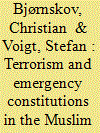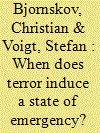| Srl | Item |
| 1 |
ID:
185185


|
|
|
|
|
| Summary/Abstract |
Previous research has indicated that constitutionalized emergency provisions effectively constrain the behaviour of democratic governments subsequent to terrorist attacks. In this article, we ask if this is also true for autocratic governments. Are non-democratic governments equally subject to constitutionalized constraints regarding their reactions to emergencies and particularly to terrorist attacks? To answer the question, we analyse the behaviour of a specific group of predominantly autocratic governments that are particularly subject to frequent terrorist incidents, namely the states that are members of the Organisation of Islamic Cooperation. Employing data on terrorist activity from the Global Terrorism Database and constitutional data from the Index of Emergency Powers, we estimate the association between constitutionalized constraints and terrorist attacks in a dataset covering 48 member-states of the organization observed annually between 1970 and 2014. As hypothesized, we find that emergency constitutions that politically make it relatively cheap for governments to declare a state of emergency are more likely to be invoked. In addition, we find that governments are more likely to increase repression after terrorist events when the constitution allocates more discretionary power to the government in emergencies. Our evidence thus suggests that emergency constitutions also impact on the behaviour of largely autocratic governments.
|
|
|
|
|
|
|
|
|
|
|
|
|
|
|
|
| 2 |
ID:
172334


|
|
|
|
|
| Summary/Abstract |
The relationship between terrorist activities and states of emergency has never been explored in a cross-country perspective. This article is a first step to change that. Given that a terror act has been committed, what are the factors that lead governments to declare a state of emergency (SOE)—or refrain from declaring it? And given that a SOE has been declared, what are the effects thereof? On the basis of seventy-nine countries all having Western-style constitutions, we find that more terrorist incidents increase the likelihood of a SOE. Interestingly, emergencies are less likely to be declared in election years, supposedly because governments believe them to be unpopular. Once a SOE is declared, it generally leads to substantially more government repression. Finally, countries already under a SOE are more likely to suffer from additional terror attacks, challenging the effectiveness of states of emergency.
|
|
|
|
|
|
|
|
|
|
|
|
|
|
|
|